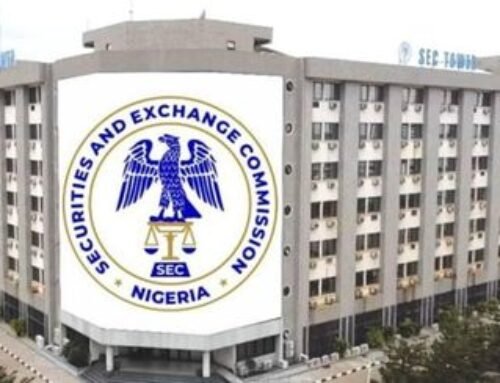
Estimated at 20 to 25 percent of our Gross Domestic Product (GDP), Nigeria’s infrastructure stock is still significantly lower than the recommended international benchmark of 70 percent of the GDP.
The 2014 National Integrated Infrastructure Master Plan (NIMP) estimates that a total of $3 trillion of investments, or $100 billion annually, is required over the next 30 years to bridge Nigeria’s infrastructure gap.
This huge infrastructure deficit in Nigeria apparently prompted DataPro Limited, the technology-driven credit rating agency (CRA), to organise a webinar to explore ways of boosting infrastructure development.
In his introductory comments, Mr. Abimbola Adeseyoju, the Managing Director of DataPro, said the webinar was a “Continuation of our strive for mutually beneficial partnership for the market, we have also joined forces with the International Islamic Rating Agency (IIRA) to deepen the Sukuk Market in Nigeria.
According to Adeseyoju, “Our goal is to ensure that investors and the country as a whole can benefit from the value addition of Sukuk and other innovative products and services.”
Delivering his lecture, Asishana Okauru, Director-General, Nigeria Governors’ Forum, NGF, said, “We are concerned by the extent of infrastructure neglect and over-utilisation given that many of our cities have been overwhelmed by the rapid rise of urban agglomeration as more people continue to migrate from rural to urban areas.
Okauru admitted, “State governments have a major role to play in closing this gap by financing areas that are not exactly bankable and capable of sufficiently mobilising private finance, through public private partnerships, and through regulations required to attract and promote the growth of untapped private finance. States already see the urgency of this intervention because of the general demand for immediate tangible results from the populace.
“Some work has been initiated in this regard. In November 2019, the National Economic Council (NEC) set up a committee to consider how a portion of accumulated pension funds can be leveraged for infrastructure investments in collaboration with the Nigeria Sovereign Investment Authority (NSIA).
“The objective is to leverage the pension fund assets under management through a National Infrastructure Investment Fund (NIIF) to fund essential infrastructure projects that will complement projects implemented under the Presidential Infrastructure Development Fund (PIDF). The success of this initiative still depends on building strong investor confidence that will also help build new asset classes,” the DG said.
According to Okauru, “This conversation would not be complete without talking about the importance of progress on revenue sustainability and debt management. We note the trend in federation revenues of states, which make up 65 percent of their total recurrent expenditure, and the increasing risk of a deteriorating exchange rate. These challenges continue to highlight the importance of revenue diversification and domestic resource mobilisation in the country.
“To supplement the practice of credit rating, we can do more on risk mitigation and credit enhancement, including perhaps creating co-guarantee platforms that will help develop and deploy innovative instruments to de-risk private sector investments at scale. In delivering any support, we recognise the important role of the Central Bank of Nigeria (CBN), the Securities and Exchange Commission (SEC) and the National Pension Commission in setting and enforcing standards.
Okauru concluded his delivery by expressing the hope that the webinar is “a start of wider collaborations between the NGF and this community.”
Director General of the Securities and Exchange Commission (SEC), Mr. Lamido Yuguda, who emphasised that infrastructure is the lifeblood of any economy, maintained that in Nigeria, the challenges posed by traditional funding sources make capital markets increasingly the preferred way to finance infrastructure.
Yuguda explained, “In early recognition of the importance of infrastructure finance through the capital market, the Securities and Exchange Commission (SEC) has made concerted efforts at developing the necessary regulatory frameworks to unlock the potentials associated with non-conventional financial products such as Sukuk, Green Bonds, Social Bonds, Securitization and Infrastructure Funds, which are capable of attracting large long term investments from the international markets.
The SEC Chief promised that the SEC is always ready to provide the required support to the relevant stakeholders of the Nigerian capital market.
For the organiser and MD/CEO of DataPro, Adeseyoju, the event was “A continuation of our collective efforts at promoting the value proposition of the credit rating industry as an unbiased and efficient way of allocating financial resources within the capital market, which ultimately will result to economic growth and national prosperity.
He maintained that it is time for a “paradigm shift” in the ways things are done if we truly want to expand the market and create more opportunities as well as better options for stakeholders and the generality of investors, entrepreneurs, companies and operators alike.
Adeseyoju added, “Technology has changed the world, the way we do things and definitely the rating industry. It has become a leveler for knowledge, skills acquisition and understanding. To make progress, we have to be open to new ideas, innovation and better ways of doing things.
Preaching globalisation, he said, “The world is a global village. Therefore, collaboration and cooperation are imperative for standard unification. Collaboration and cooperation will also foster new ideas and value creation. Consequently, we welcome the idea of a Pan-African Association of Credit Rating Agency as a leverage for global standards where everybody within the space will feel welcome as equals.
Adeseyoju concluded by assuring that the yearly International Credit Rating Webinar would hold every 2nd Thursday in October of every year.





